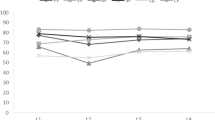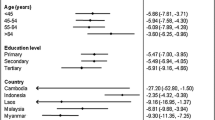Abstract
Purpose
This study investigates the association between socioeconomic position (SEP) and health-related quality of life (HRQoL) in a cross-sectional cohort among cancer survivors and compares with cancer-free people.
Methods
Survivors of colorectal, hematological, gynecological, prostate, thyroid cancer, and melanoma diagnosed 2000–2014 were identified in the PROFILES registry, and an age- and sex-matched cancer-free population were identified in the CentER panel. HRQoL, education, and comorbidity were self-reported. Street-level income and clinical factors were obtained from Statistics Netherlands and the Netherlands Cancer Registry. Multivariable logistic regression was used to examine associations of SEP (measured by education and income) and impaired HRQoL among cancer survivors and the cancer-free population, adjusting for age, sex, and time since diagnosis.
Results
We included 6693 cancer survivors and 565 cancer-free people. Cancer survivors with low versus medium SEP more frequently reported impaired HRQoL (odds ratio (OR) range for all HRQoL outcomes, 1.06–1.78 for short education and 0.94–1.56 for low income). Survivors with high compared to medium SEP reported impaired HRQoL less frequently (OR range for all HRQoL outcomes, 0.46–0.81 for short education and 0.60–0.84 for low income). The association between SEP and HRQoL was similar in the matched cancer-free population.
Conclusion
Low SEP was associated with impaired HRQoL in both cancer survivors and cancer-free people.
Implications for Cancer Survivors
Targeted care is warranted for cancer survivors with impaired HRQoL, especially among those with low SEP.



Similar content being viewed by others
Data availability
The PROFILES registry data has been freely available since 2011, according to the Findable, Accessible, Interoperable, Reusable (FAIR) data principles for non-commercial (international) scientific research, which are subject only to privacy and confidentiality restrictions. Data is made available through Questacy (DDI 3.x XML), which can be accessed by the PROFILES registry website (http://www.profilesregistry.nl). The quality guidelines that are formulated in the “Data Seal of Approval” (http://www.datasealofapproval.org) document, developed by Data Archiving and Networked Services (DANS), are followed in order to arrange optimal long-term data warehousing and dissemination.
References
Marmot M. Social determinants of health inequalities. Lancet. 2005;365(9464):1099–104.
Braaten T, Weiderpass E, Lund E. Socioeconomic differences in cancer survival: the Norwegian Women and Cancer Study. BMC Public Health. 2009;9:178.
Dalton SO, et al. Socioeconomic position, stage of lung cancer and time between referral and diagnosis in Denmark, 2001–2008. Br J Cancer. 2011;105(7):1042–8.
Dalton SO, et al. Socioeconomic inequality in cancer survival - changes over time A population-based study, Denmark, 1987-2013. Acta Oncol. 2019;58(5):737–44.
Degett TH, et al. Nationwide cohort study of the impact of education, income and social isolation on survival after acute colorectal cancer surgery. BJS open. 2020;4(1):133–44.
Frederiksen BL, et al. Social inequalities in stage at diagnosis of rectal but not in colonic cancer: a nationwide study. Br J Cancer. 2008;98(3):668–73.
Rutqvist LE, Bern A. Socioeconomic gradients in clinical stage at presentation and survival among breast cancer patients in the Stockholm area 1977–1997. Int J Cancer. 2006;119(6):1433–9.
Tomic K, et al. Socioeconomic status and diagnosis, treatment, and mortality in men with prostate cancer. Nationwide population-based study Int J Cancer. 2018;142(12):2478–84.
Valachis A, et al. Treatment patterns, risk for hospitalization and mortality in older patients with triple negative breast cancer. J Geriatr Oncol. 2021;12(2):212–8.
Willen L, et al. Educational level and management and outcomes in non-small cell lung cancer. A nationwide population-based study Lung Cancer. 2019;131:40–6.
Ammitzboll G, et al. Socioeconomic inequality in cancer in the Nordic countries. Syst Rev Acta Oncol. 2022;61(11):1317–31.
Galobardes B, et al. Indicators of socioeconomic position (part 1). J Epidemiol Community Health. 2006;60(1):7–12.
Han X, et al. Factors associated with health-related quality of life among cancer survivors in the United States. JNCI Cancer Spectr. 2021;5(1):pkaa123.
Wu HS, Harden JK. Symptom burden and quality of life in survivorship: a review of the literature. Cancer Nurs. 2015;38(1):E29-54.
Annunziata MA, et al. Long-term quality of life profile in oncology: a comparison between cancer survivors and the general population. Support Care Cancer. 2018;26(2):651–6.
Graells-Sans A, et al. Social inequalities in quality of life in a cohort of women diagnosed with breast cancer in Barcelona (DAMA Cohort). Cancer Epidemiol. 2018;54:38–47.
Klein J, et al. Socioeconomic status and health-related quality of life among patients with prostate cancer 6 months after radical prostatectomy: a longitudinal analysis. BMJ Open. 2016;6(6):e010968.
Roick J, et al. The association of socioeconomic status with quality of life in cancer patients over a 6-month period using individual growth models. Support Care Cancer. 2019;27(9):3347–55.
White VM, et al. Disparities in quality of life, social distress and employment outcomes in Australian cancer survivors. Support Care Cancer. 2022;30(6):5299–309.
van de Poll-Franse LV, et al. The Patient Reported Outcomes Following Initial treatment and Long term Evaluation of Survivorship registry: scope, rationale and design of an infrastructure for the study of physical and psychosocial outcomes in cancer survivorship cohorts. Eur J Cancer. 2011;47(14):2188–94.
van de Poll-Franse LV, et al. Normative data for the EORTC QLQ-C30 and EORTC-sexuality items in the general Dutch population. Eur J Cancer. 2011;47(5):667–75.
Sangha O, et al. The Self-Administered Comorbidity Questionnaire: a new method to assess comorbidity for clinical and health services research. Arthritis Rheum. 2003;49(2):156–63.
Aaronson N, et al. The European Organization for Research and Treatment of Cancer QLQ-C30 - a quality-of-life instrument for use in international clinical-trials in oncology. J Natl Cancer Inst. 1993;85(5):365–76.
Fayers PM, et al. EORTC QLQ-C30 scoring manual (3rd edition). Brussels: EORTC; 2001.
Giesinger JM, et al. Thresholds for clinical importance were established to improve interpretation of the EORTC QLQ-C30 in clinical practice and research. J Clin Epidemiol. 2020;118:1–8.
van Leeuwen M, et al. Understanding the quality of life (QOL) issues in survivors of cancer: towards the development of an EORTC QOL cancer survivorship questionnaire. Health Qual Life Outcome. 2018;16(1):114.
Glymour MM. Using casual diagrams to understand common problems in social epidemiology, in methods in social epidemiology. In: Oaks JM, Kaufman JS, editors. Jossey-Bass. 2nd ed. 2017. p. 458–93.
Greenland S, Pearl J. Causal diagrams for epidemiologic research. Epidemiology. 1999;10(1):37–48.
Jayakrishnan TT, et al. Disparities in the enrollment to systemic therapy and survival for patients with multiple myeloma. Hematol Oncol Stem Cell Ther. 2021;14(3):218–30.
Ngo P, et al. Lung cancer treatment patterns and factors relating to systemic therapy use in Australia. Asia Pac J Clin Oncol. 2022;18(5):e235–46.
Aarts MJ, et al. The impact of socioeconomic status on prostate cancer treatment and survival in the southern Netherlands. Urology. 2013;81(3):593–9.
Aarts MJ, et al. Socioeconomic status and changing inequalities in colorectal cancer? A review of the associations with risk, treatment and outcome. Eur J Cancer. 2010;46(15):2681–95.
Binotto M, et al. Health-related quality of life before and during chemotherapy in patients with early-stage breast cancer. Ecancermedicalscience. 2020;14:1007.
Chopra I, Kamal KM. A systematic review of quality of life instruments in long-term breast cancer survivors. Health Qual Life Outcomes. 2012;10:14.
Langballe R, et al. NAVIGATE: improving survival in vulnerable patients with lung cancer through nurse navigation, symptom monitoring and exercise - study protocol for a multicentre randomised controlled trial. BMJ Open. 2022;12(10):e060242.
Gotze H, et al. Comorbid conditions and health-related quality of life in long-term cancer survivors-associations with demographic and medical characteristics. J Cancer Surviv. 2018;12(5):712–20.
McDougall JA, et al. Socioeconomic disparities in health-related quality of life among colorectal cancer survivors. J Cancer Surviv. 2019;13(3):459–67.
Llewellyn CD, McGurk M, Weinman J. Are psycho-social and behavioural factors related to health related-quality of life in patients with head and neck cancer? Syst Rev Oral Oncol. 2005;41(5):440–54.
Funding
The PROFILES registry was funded by an Investment Grant (#480–08-009) of the Netherlands Organization for Scientific Research (The Hague, Netherlands). The funding agency had no further role in the design of the study; in data collection, data analysis, or interpretation of data; no role in the writing of this paper; or in the decision to publish the results.
Author information
Authors and Affiliations
Contributions
Conceptualization: AKGL, SO, LvdP; Data curation: AKGL, SO; Methodology: AKGL, SO, MA, LvdP; Formal analysis: AKGL; Investigation: AKGL, SO, LvdP, NE; Writing – original draft preparation: AKGL; Writing – review and editing: SO, LvdP, TKK, SOD, MA, NE; Supervision: SO, LvdP; Project administration: SO; Funding: LvdP.
Corresponding author
Ethics declarations
Ethics approval
Ethical approvals for the questionnaire and methodology were obtained locally for all study participants.
Consent to participate
Informed consent was obtained from all individual participants in the study.
Competing interests
The authors declare no competing interests.
Additional information
Publisher's Note
Springer Nature remains neutral with regard to jurisdictional claims in published maps and institutional affiliations.
Supplementary Information
Below is the link to the electronic supplementary material.
Rights and permissions
Springer Nature or its licensor (e.g. a society or other partner) holds exclusive rights to this article under a publishing agreement with the author(s) or other rightsholder(s); author self-archiving of the accepted manuscript version of this article is solely governed by the terms of such publishing agreement and applicable law.
About this article
Cite this article
Levinsen, A.K.G., van de Poll-Franse, L., Ezendam, N. et al. Socioeconomic differences in health-related quality of life among cancer survivors and comparison with a cancer-free population: a PROFILES study. J Cancer Surviv (2023). https://doi.org/10.1007/s11764-023-01494-y
Received:
Accepted:
Published:
DOI: https://doi.org/10.1007/s11764-023-01494-y




